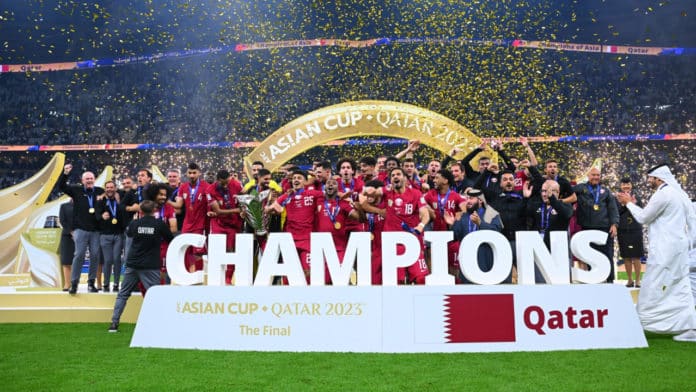Akram Afif turned hero for Qatar by netting a hat trick of penalty to help his nation win back-to-back AFC Asian Cup. Facing a brilliant Jordan side, Qatar played some exuberant football, and their brilliance in the final third was rewarded with three penalties, which Afif dispatched with great ease.
With this victory, Qatar has proven its credentials as an Asian footballing powerhouse. This achievement has been years in the making, with the nation investing a considerable amount of financial resources to improve the quality of their national team.
So, we trace Qatar’s incredible Asia Cup journey, where they proved themselves worthy of being champions again.
AFC Asian Cup Group Stage: A quest for redemption
When Qatar took the field against Lebanon in the opening game of the 2023 AFC Asian Cup, their main aim was to put behind the ghost of an underwhelming World Cup campaign just over a year back. The nation had lost all three games, a first for any hosts in the tournament’s history.
So, a good start was needed in the Asian Cup. And Qatar didn’t disappoint as they quickly scored three goals without reply to start their title defence in style. Their next two games were 1-0 wins over Tajikistan and China, respectively, which earned them a top spot. What was important in their later two wins was how they had managed to win despite being far from their best, a key feature for any title-winning team.
The incredible performance earned them a round-of-16 clash against Palestine.
Read More: What is the “Celebration Police” and why is it making headlines again?
Knockouts: Qatar’s champion mentality rises to the fore
In their previous title-winning campaign, Qatar faced Iraq and South Korea in the round of 16 and quarter-finals, respectively. So, it was unsurprising that these two games were hard-fought 1-0 wins. However, as soon as they cleared this hurdle, they easily won their final two games against the United Arab Emirates (4-0) and Japan (3-1).
This time, though, their route was far more straightforward, but still, Qatar failed to perform at their 2019 level. However, Qatar had one trick up its sleeve: experience. They had one before and knew how to calm their nerves in crunch situations.
The first test of it came against Palestine. In a tightly contested game, Bassam Al Rawi got the decisive goal. Iraq had outshot the defending champions 11-9 on the night. In addition, Palestine also had more shots on target (5-3), but the brilliance of goalkeeper Meshaal Barsham ensured that they advanced to the quarter-finals.
Their next game was against 68th-ranked Uzbekistan. On paper, Qatar appeared to be heavy favorites against a defensive-minded team. However, Uzbekistan proved to be one of the most formidable challengers for the Gulf nation in recent times.
The game was tied at 1-1 at the end of 90 minutes, which meant extra time was needed. Qatar’s impressive forward line of Afif and Almoez Ali needed help finding a way past the impressive Utkir Yusupov in the Uzbek goal.
Qatar again fell back on their experience and won 3-2 on penalties to scrape through to the semi-final by the barest of margins.
Waiting for them in the final four was Irah, the only team apart from Qatar, who still had a 100 per cent winning record. It was a clash of titans, with everyone expecting an epic clash. And this is what the two teams provided for the fans at the Al Thumama Stadium in Doha.
Sardar Azmoun opened the scoring in the fourth minute before Qatar leveled through Jassem Gaber 13 minutes later; Qatar ended the first half with a 2-1 lead after Afif scored his fifth goal of the tournament.
Iran came back in the second half with Alireza Jahanbakhsh equalising for the visitors. With their backs against the wall, Ali got what turned out to be the decisive goal in the 82nd minute. Once again, Qatar were far from its best, with Iran outshooting them 23-15 on the night, but Qatar’s attacker’s proficiency proved to be the key difference.
The final against Jordan however should be taught in footballing schools as the proof of how much of an advantage can experience bring to a team. On a night when Jordan played brilliant football, Qatar’s temperament won them the title.
Qatar wins the @afcasiancup for the second time in a row after beating Jordan 3-1 🏆
Afif Ansari bagged a hattrick with the help of 3 penalties 🔥#AFCAsianCup2023 pic.twitter.com/hLfmgCV8jV
— FootTheBall FC (@FootTheBallFC) February 10, 2024
All three of their goals came from a penalty. However, each of these penalties were the result of a reckless challenge from Jordan. However, on closer inspection, one sees a clear pattern in all three spot kicks.
In the first, Afif’s quick footwork deceived Abdallah Nasib and forced him to make just enough of a challenge to warrant a penalty. The second penalty, however, was the perfect example of how Jordan couldn’t handle their nerves. The visitors had just got their equalizer, and Qatar were on the back foot. However, Mahmoud Al-Mardi made an unnecessary challenge at the edge of the box. When the challenge was made, the ball was near the edge of the goal, and Qatar were in no way in a position to score. However, the nerves of a major final got to the Jordanians.
In the end, Qatar showed that experience can make up for many shortcomings in a game, and it is a fact that they have repeatedly proved.
This article is sponsored by Data Security Council of India (DSCI), is a not-for-profit, industry body on data protection in India, setup by NASSCOM®, committed to making the cyberspace safe, secure and trusted by establishing best practices, standards and initiatives in cyber security and privacy.




